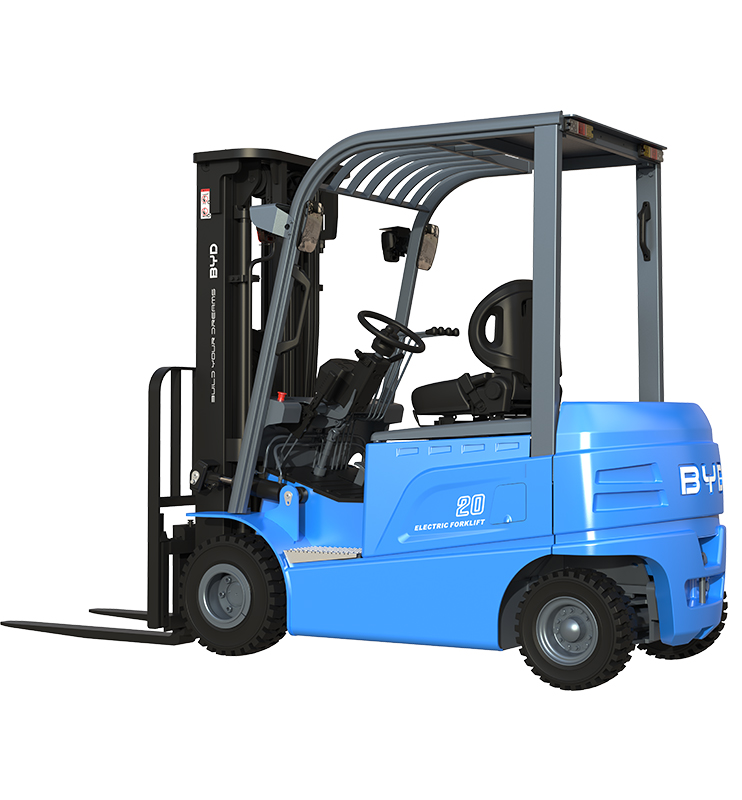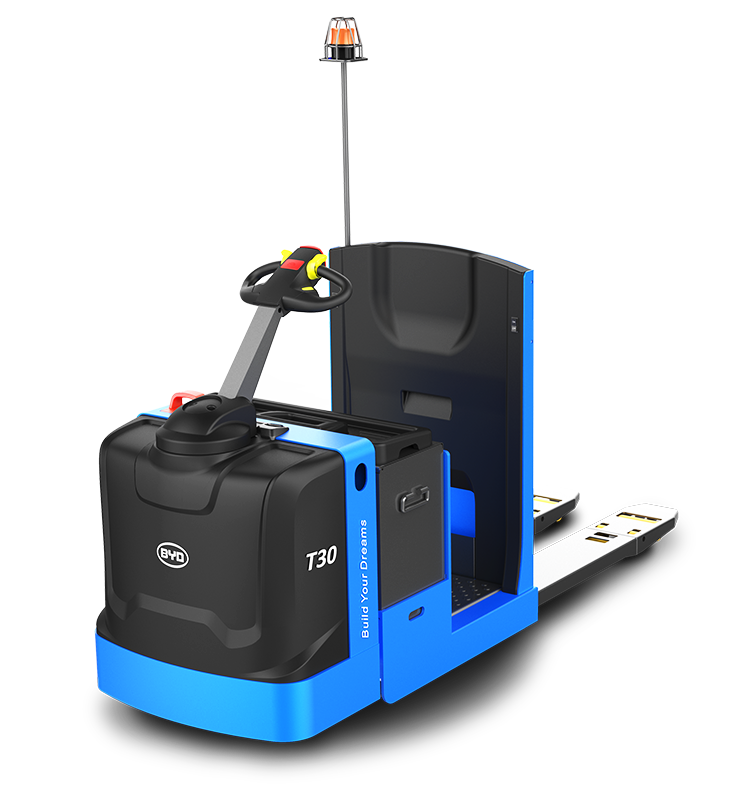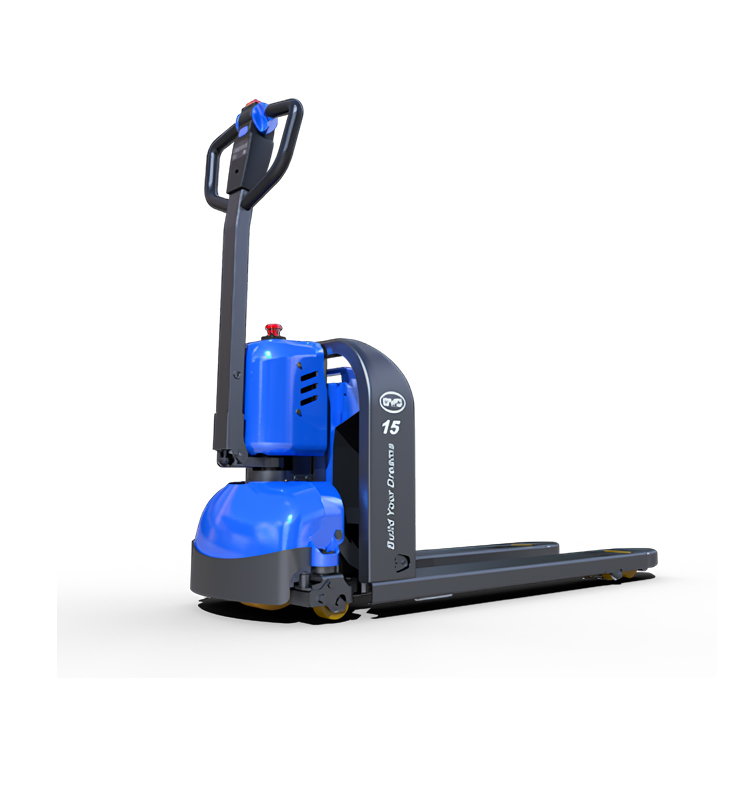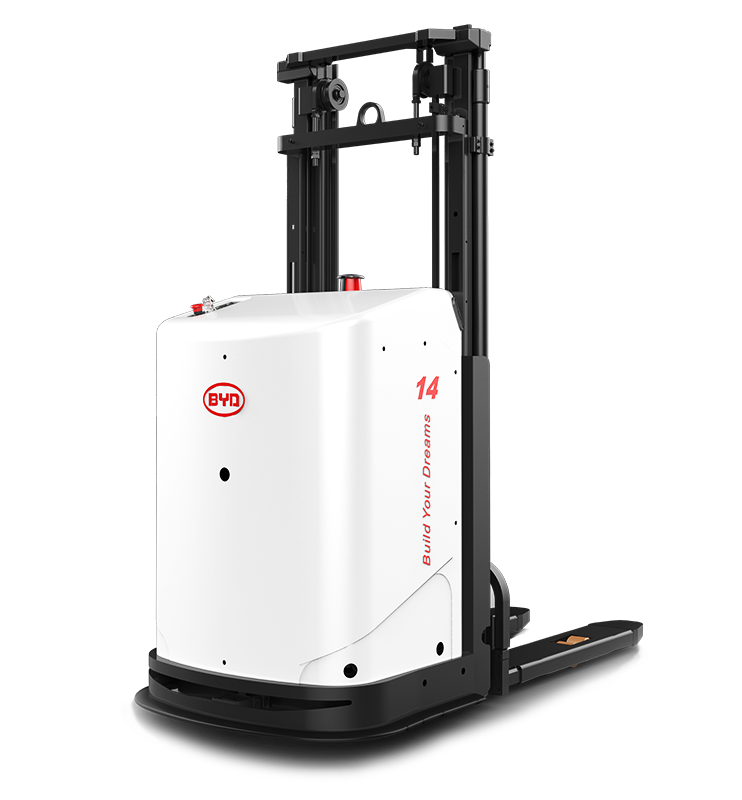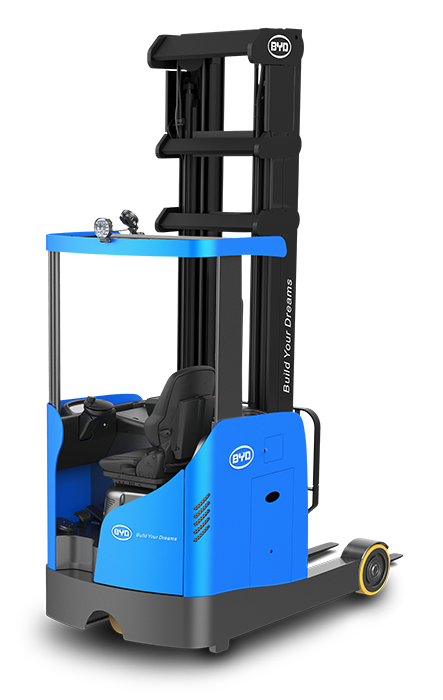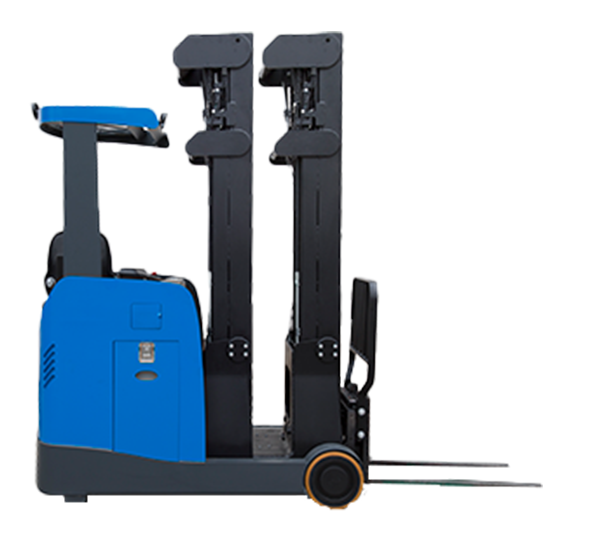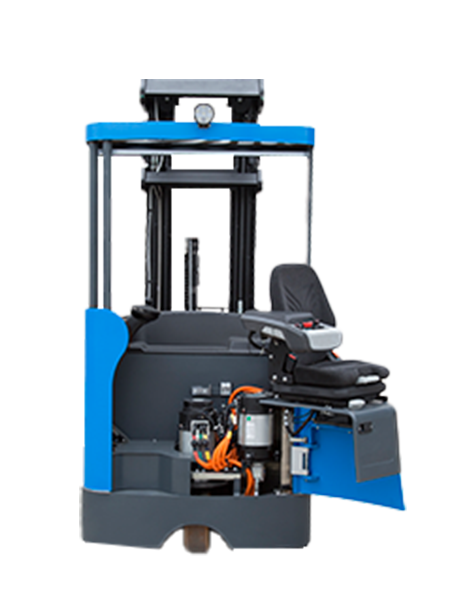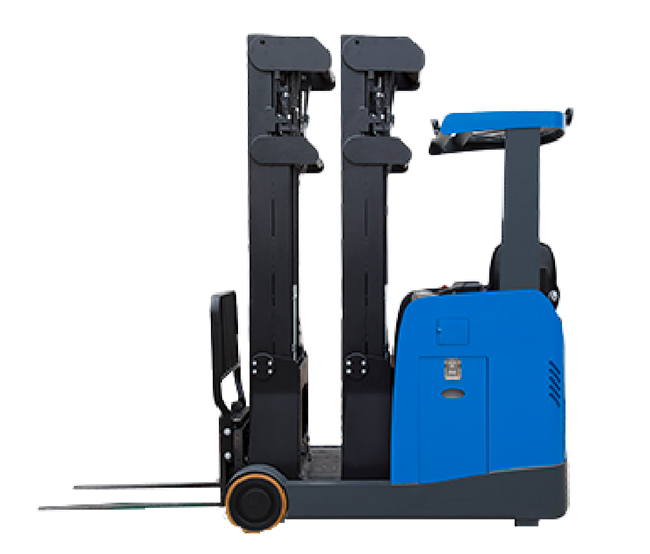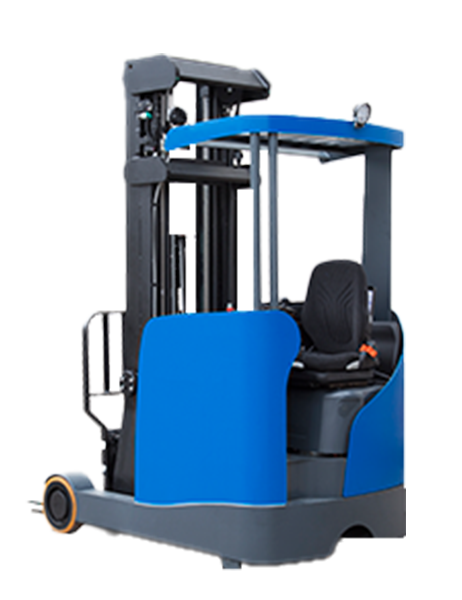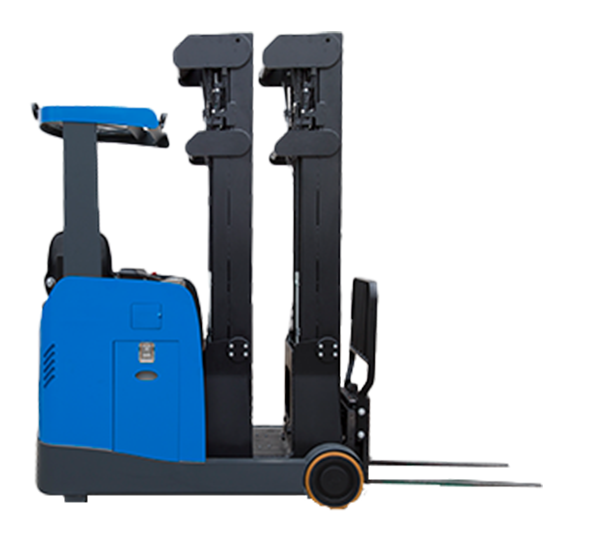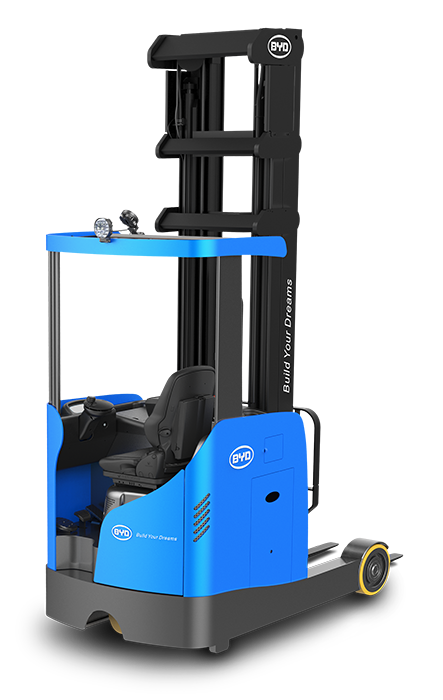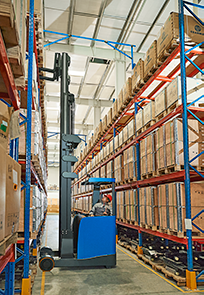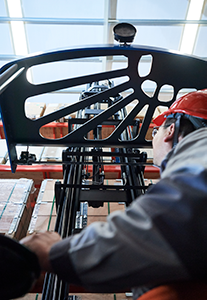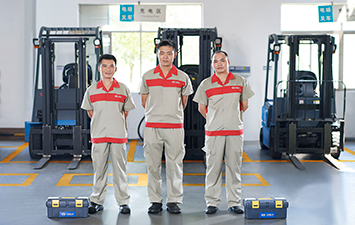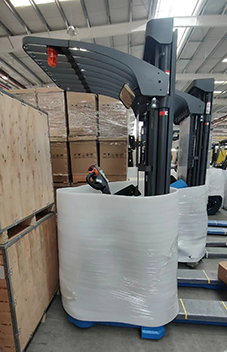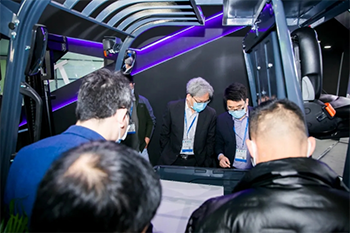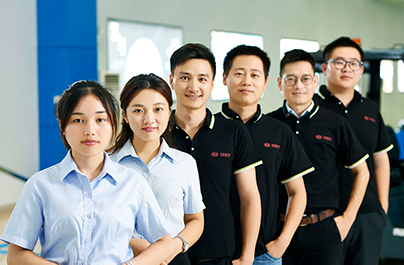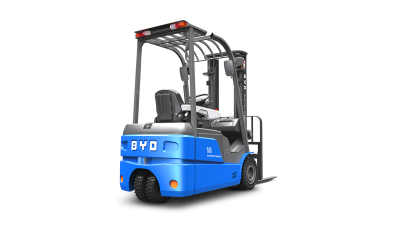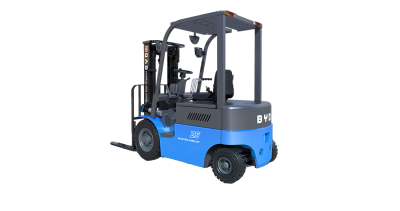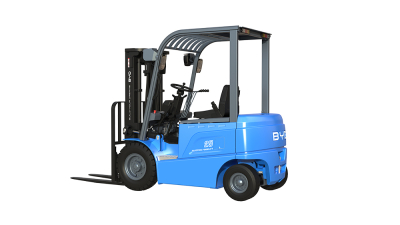Sit Down Reach Truck RTR16
Fast Charging: Equipped with an 80V/270A battery, it can meet the demands of long-duration operations. It comes with a national standard charging port for convenient, efficient, and safe charging.
Easy Operation: The instrument panel can display real-time information such as lifting height, steering angle, and cargo weight, making operation straightforward.
High Safety: The offset-free cylinder design provides a wider field of vision for the driver. The gantry has cushioning functionality in the 8 to 8.5-meter lifting height range. It features OPS seats, overload protection, high-angle tilt protection, and energy-regenerative braking for enhanced safety.
Powerful Performance: Advanced batteries, motors, and electronic controls are configured to create an excellent powertrain, delivering strong performance. It meets the requirements for stacking and handling warehouse goods, efficiently improving warehousing logistics efficiency.
Product description:
The BYD RTR16 model is the first Reach Truck to be launched on the BYD product line featuring state-of-the-art design combined with optimum driving comfort, safety and work efficiency. Powered by BYD lithium Iron-phosphate technology, its state-of-the-art battery management system has the longest warranty in the industry: 8 years or 10,000 hours, whichever comes first.
Product Parameter
Identification | 1.1 | Manufacturer | BYD | ||
1.2 | Model | RTR16 | |||
1.3 | Drive | Electric | |||
1.4 | Operator type | Seated | |||
1.5 | Rated capacity | Q | kg | 1600 | |
1.6 | Load center | C | mm | 600 | |
1.8 | Load distance, center of drive axle to fork | X | mm | 188/400 | |
1.9 | Wheelbase | Y | mm | 1470 | |
weight | 2.1 | Net weight including battery | kg | 4070 | |
2.3 | Axle loading, fork advanced,laden front/rear | kg | 1909/2361 | ||
2.4 | Axle loading, unladen front/rear | kg | 1038/4832 | ||
2.5 | Axle loading, fork retracted, laden front/rear | kg | 2627/1643 | ||
Wheels
| 3.1 | Wheel type | PU | ||
3.2 | Tyre size, front | mm | ∅343×136 | ||
3.3 | Tyre size, rear | mm | ∅340×100 | ||
3.5 | Wheels, number front rear (x=driven wheels) | 1x/2 | |||
3.7 | Tread width, rear | b11 | mm | 1170 | |
Dimensions | 4.1 | Tilt of mast/fork carriage forward/backward | α/β | (°) | 2/4 |
4.2 | Mast height(lowered) | h2 | mm | 3496 | |
4.3 | Free lift | h2 | mm | 2250 | |
4.4 | Lift height | h3 | mm | 8500 | |
4.5 | Extended mast height | h4 | mm | 9746 | |
4.7 | Height of overhead guard | h6 | mm | 2345 | |
4.8 | Seat height/standing height | h7 | mm | 1020 | |
4.10 | Height of support arms | h8 | mm | 360 | |
4.19 | Overall length | l1 | mm | 2555 | |
4.20 | Length to the face of forks | l2 | mm | 1355 | |
4.21 | Overall width | b1 | mm | 1270 | |
4.22 | Fork dimensions | s/e/l | mm | 35×100×1200 | |
4.23 | Fork carriage ISO 2328, class/type A,B | 2A | |||
4.24 | Fork carriage width | b3 | mm | 730 | |
4.25 | Width across fork | b5 | mm | 430/678 | |
4.26 | Width between support arms/loading areas | b4 | mm | 930 | |
4.28 | Reach distance | l4 | mm | 588 | |
4.31 | Ground clearance, under the mast | m1 | mm | 73 | |
4.32 | Ground clearance, center of wheelbase | m2 | mm | 80 | |
4.33 | Aisle width for pallets 1000×1200 crossways | Ast | mm | 2848 | |
4.34 | Aisle width of pallets 800×1200 lengthways | Ast | mm | 2904 | |
4.35 | Turning radius | Wa | mm | 1758 | |
4.37 | Length across support arms | l7 | mm | 1930 | |
Performance Data | 5.1 | Travel speed, with/without load | Km/h | 13/13 | |
5.2 | Lift speed, with/without load | mm/s | 380/680 | ||
5.3 | Lowering speed, with/without load | mm/s | 550/550 | ||
5.4 | Mast reaching speed, with/without load | mm/s | 180/180 | ||
5.4a | Mast retracting speed, with/without load | mm/s | 180/180 | ||
5.8 | Max. gradeability, with/without load | % | 12/12 | ||
5.9 | Acceleration time, with/without load (0-10mm) | 5.6/5.0 | |||
5.10 | Service brake | Hydraulic/Mechanic | |||
Electric Motor | 6.1 | Drive motor rating S2 60 min. | kW | 6.8/13.2 | |
6.2 | Lift motor rating at S3 15% | kW | 12/19 | ||
6.4 | Battery voltage/nominal capacity K5 | V/Ah | 80/270 | ||
6.5 | Battery weight | kg | 425 | ||
8.1 | Type of drive control | AC | |||
8.2 | Operating pressure for attachments | bar | 210 | ||
8.4 | Sound level at the driver’s ear | dB(A) | ≤75 |
Classification:
BYD Iron-Phosphate Technology
Battery 80V 270Ah (21.6 kWh)
AC drive
4-way valve
Fork tilting
Hook-on side-shifter
Finger-tip control
TFT display
Cornering speed reduction
OPS (Operator Presence Sensor)
Regenerative braking system
Load wheel brake
Charger 80V 100A
2-hour charging time
Adjustable steering wheel
Orange seat belt with sensor
Optional configuration:
1-hour fast-charging solution
Charger 80V 200A
Fork camera system
Load weight indicator
Overload protection
Height display
Laser light
High level speed limit
Blue light
Panoramic mirror
Rear working light
Second-level Fully Articulated
Third-level Fully Articulated Mast
Speed reduction with mast lifted
Customized Forks
Use:
Warehousing and Logistics industry, manufacturing industry, retail industry, electronics industry, food and beverage industry, pharmaceutical industry, agriculture
Product advantages:
Fast Charging: Equipped with an 80V/270A battery, it can meet the demands of long-duration operations. It comes with a national standard charging port for convenient, efficient, and safe charging.
Easy Operation: The instrument panel can display real-time information such as lifting height, steering angle, and cargo weight, making operation straightforward.
High Safety: The offset-free cylinder design provides a wider field of vision for the driver. The gantry has cushioning functionality in the 8 to 8.5-meter lifting height range. It features OPS seats, overload protection, high-angle tilt protection, and energy-regenerative braking for enhanced safety.
Powerful Performance: Advanced batteries, motors, and electronic controls are configured to create an excellent powertrain, delivering strong performance. It meets the requirements for stacking and handling warehouse goods, efficiently improving warehousing logistics efficiency.
Product inspection:
BYD forklift manufacturer typically conducts rigorous product inspections and quality control when producing forklift products to ensure that their quality and performance meet high standards. These product inspects starts as from Raw Material Inspection: During the production process, BYD inspects the raw materials used. This includes checking steel, electronic components, lubricants, coatings, and more. Raw materials must meet specific quality standards and specifications.
Manufacturing Process Inspection: During the forklift's manufacturing process, BYD monitors and inspects key process steps to ensure that each component meets design specifications. This includes inspections of welding, mechanical processing, electrical connections, and other aspects.
Performance Testing: After the forklift is assembled, performance testing is conducted. This includes checking engine power, suspension systems, brake systems, driver control systems, and more to ensure that the forklift's performance meets specified standards.
Safety Testing: BYD forklifts undergo safety testing to ensure compliance with relevant safety standards. This includes collision tests, stability tests, electrical safety tests, and others.
Quality Control: BYD implements a quality control system, including inspection and testing procedures, document records, employee training, and more, to ensure product consistency and quality.
Final Inspection: After the completion of forklift production, a final inspection is performed. This involves a comprehensive check of the entire forklift to ensure that all components are installed correctly, there are no obvious defects, and performance is excellent.
Product Certification: Once the forklifts pass all necessary inspections and tests, they may receive relevant product certifications to prove compliance with international and regional quality and safety standards.
Packaging and transportation:
The packaging and transportation of forklifts are typically handled by the manufacturer and suppliers to ensure that the products are not damaged during transit.
Packaging: Forklifts are usually packaged before leaving the factory to protect their appearance and mechanical components from damage. Packaging typically includes the use of wooden crates, foam padding, plastic film, and strapping materials to ensure that the forklifts are not affected by bumps and collisions during transportation.
Inspection and Testing: Before leaving the factory, manufacturers typically conduct rigorous inspections and testing on the forklifts to ensure that they function properly and can be safely transported. This includes checking mechanical components, batteries, brake systems, and more.
Shipping: Once the forklifts are properly packaged and pass inspection, they are prepared for shipping. Forklifts can be transported to their destination via road transportation, sea shipping, air freight, or other methods, depending on the distance, region or country and customer requirements.
Documentation and Permits: Depending on the requirements of the destination country or region, relevant documents and permits may need to be provided to ensure that the forklifts can legally enter and be used in the destination country or region.
Company introduction:
BYD Forklift, established in 2009, is a subsidiary of BYD Co., Ltd., located in the Zhenjiang district of Shaoguan City. The total investment for the project is 515 million RMB, covering an area of approximately 700,000 square meters. It is mainly responsible for producing BYD electric forklift series, including the electric counterbalance forklift series, electric warehouse forklift series, and electric tow tractor series, among others.
BYD Forklift possesses a complete forklift production line, including four machining and welding lines, one painting line, and three final assembly lines, achieving an annual production capacity of 30,000 units. Furthermore, the factory has a professional testing line and a comprehensive quality system, certified under ISO9001, to ensure the quality of every forklift and provide customers with satisfactory quality and excellent service.
BYD Forklift has always aimed to create a leading global brand in electric forklifts. 'Pursuing excellence and continuous innovation' is the development philosophy of BYD Forklift, continuously optimizing and upgrading its products, covering a perfect range of applications from warehousing and logistics to port and terminal logistics. The market expansion includes multiple industries such as pharmaceuticals, food, cold chain processing, cosmetics, logistics, and more. In the process of market feedback, BYD electric forklifts have fully demonstrated their significant advantages in green environmental protection and energy efficiency, receiving unanimous praise from customers at home and abroad, laying a solid foundation for BYD electric forklifts to become a globally trusted brand.
In response to market development needs, BYD Forklift is constructing a comprehensive electric forklift base in the Ningbo Industrial Park, integrating research and development, production, sales, and after-sales service. After completion, the project will be centered in the Yangtze River Delta, covering East China and radiating nationwide and for export. The planned total investment for BYD Forklift's Ningbo factory is 500 million RMB, which will include a 60,000 square meters facility encompassing processes such as vehicle machining, welding, painting, assembly, and modification, with the capacity to produce 20,000 electric counterbalance forklifts and 30,000 warehouse forklifts annually.
Customer visit:
Before conducting customer visits, the sales or customer service teams typically schedule appointments with customers and plan the visit's timing, location, and agenda. This is done through phone calls, emails, or other communication methods. The sales or customer service teams do specify the topics to be discussed with the customers, which include product presentations, issue resolution, training, business negotiations, or contract signings, among others. BYD’s customer service teams usually prepare relevant documents and presentation materials to share with customers which may include product manuals, presentation slides, samples, and more.
After the visit concludes, BYD’s sales or customer service teams typically document the meeting's content, discussion outcomes, and plans for the next steps. We also maintain ongoing communication with customers to ensure their needs are met
FAQ:
1. Q: What industries are BYD warehouse reach trucks suitable for?
A: BYD warehouse reach trucks are typically suitable for various industries, including warehousing and logistics, manufacturing, retail, electronics, food and beverage, pharmaceuticals, and more. They are used for transporting, stacking, and storing goods, improving logistics efficiency.
2. Q: What are the different models and capacities of BYD warehouse reach trucks?
A: BYD offers a variety of models and capacities for warehouse reach trucks to meet the specific needs of different customers. The choice of model and capacity depends on specific application requirements and working environments.
3. Q: What type of power source do BYD warehouse reach trucks use?
A: BYD warehouse reach trucks typically use batteries as their power source, which helps reduce emissions, improve energy efficiency, and reduce noise.
4. Q: Is operating BYD warehouse reach trucks easy to learn?
A: Operating BYD warehouse reach trucks is generally relatively easy to learn, but operators need to undergo training and obtain the relevant driver's license. BYD typically provides training and educational materials to ensure that operators understand safe operation and best practices.
5. Q: Do BYD warehouse reach trucks come equipped with safety features?
A: Yes, BYD warehouse reach trucks typically come equipped with various safety features, such as brake systems, reverse warning devices, seat belts, and emergency stop systems, to ensure the safety of operators and those around them.
6. Q: How do you perform the daily maintenance of BYD warehouse reach trucks?
A: Daily maintenance is crucial for the performance and longevity of forklifts. BYD typically provides maintenance recommendations and plans, including tasks such as regular inspections, part replacements, cleaning, and lubrication. Operators and maintenance personnel should follow these recommendations for forklift maintenance.
7. Q: Does BYD provide after-sales support and repair services?
A: Yes, BYD typically offers after-sales support and repair services, including training for maintenance personnel, spare parts supply, maintenance and servicing plans, and technical support. If you encounter issues or require repairs, you can contact an authorized BYD service center or dealer for assistance.
8. Q: What optional attachments and configurations are available for BYD warehouse reach trucks?
A: BYD typically offers a variety of optional attachments and configurations to meet different application needs. These attachments and configurations may include different types of forks, attachments, cabin configurations, hydraulic functions, and other customization options to adapt to specific work environments and tasks.
